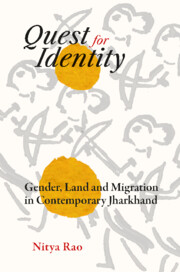3 - Questioning Women’s Solidarity: The Case of Land Rights in the Santal Parganas
Published online by Cambridge University Press: 26 July 2023
Summary
Introduction
The historic United Nations (UN) statement of the mid-1980s that women, comprising 50 per cent of the world's population, own just 1 per cent of its property, generated considerable research and policy interest in property and land rights, particularly in rural, agrarian societies. Women's land rights now constitute the magic potion for poverty reduction, agricultural growth and women's empowerment. The shift, partly due to feminist advocacy (Agarwal, 1994, 1998), has conflated gender inequality with inequality in resource allocation, particularly land. Other critical constraints that women face are disregarded (Razavi, 2003).
Women's land rights are seen as particularly important in the context of demographic changes in occupational patterns, with more and more men migrating to urban areas or looking for non-farm work in rural areas. In India, for instance, Visaria (1996) analyses National Sample Survey (NSS) data to show that while the proportion of rural male workers in agriculture declined from 83.7 per cent to 74 per cent from 1961 to 1993–94, the proportion of women dropped only marginally from 89.7 per cent to 86.1 per cent during this period. Given that the relative share of women in the agricultural labour force is higher than that of men, lack of women's land rights is seen as a major bottleneck in improving agricultural production.
The International Fund for Agricultural Development (IFAD)'s Rural Poverty Report argues that ‘the strength of custom and male power make it difficult to identify practical changes to land systems that will improve women's land rights’ [2001: 87], consequently enhance production and lead to a reduction in poverty. Within this framework, the problem of land distribution is presented as a struggle for control between men and women, or between modern and customary law. Such oppositional positioning and dichotomisation between genders or legal frameworks, each presented as internally united and homogenous, ignores the mutuality and interdependence between men and women, as well as between the state and community institutions. These are not autonomous individuals or spheres, but constantly adapting in relation to each other (S. F. Moore, 1978), when seen from a historical perspective.
- Type
- Chapter
- Information
- Quest for IdentityGender, Land and Migration in Contemporary Jharkhand, pp. 66 - 94Publisher: Cambridge University PressPrint publication year: 2024



